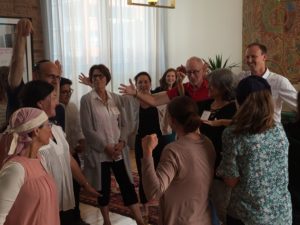Professional Development for Professional Development Providers
September 24th, 2018
The Foundation is pleased to share reflections and learnings from its two recent convenings on Leadership Development and Educator Training (below), respectively, both of which stemmed from the Foundation’s first open RFP last year.
In the last year, the Foundation has conducted an experiment of sorts with professional directors of ten programs focused on training Jewish educators. Stemming from the Foundation’s first open RFP, these ten programs offer compelling, creative, high quality, and dynamic cohort-based professional development experiences for Jewish educators across a diverse spectrum of content and audiences. As part of the initiative’s Professional Learning Community (PLC), the Foundation convened these directors last month for the first time. Because we realized that success would lie in the synergy of the group, our risk was in not knowing quite what to expect. What we learned and experienced may be helpful for other funders and participants considering engaging in similar communities and convenings.
The convening agenda developed by Rosov Consulting (who also are collaborating with the PLC to evaluate and provide timely learning about the initiative) provided space to 1) get to know each other and our strengths, 2) review the program participant survey results – what do the data say about the field and each program, 3) explore and discuss a case study of one program, 4) experience a “Taste of” presentations by four programs, and 5) participate in an improv session led by Second City designed to broaden participants’ creativity in problem-solving.

Throughout these experiences, the Foundation and participants grew more comfortable and more open during our time together. The benefits of being together in-person were palpable. We could be our whole selves, committed to the moment. Contrast this sentiment with how you might be on a conference call; the difference is stark.
Here are some key insights we are thinking about and on which we are reflecting:
The PLC is an integral component of the Educator Training initiative—and the convening proved to be an essential part of the PLC thus far. From past experience, the Foundation understands that program directors often work in silos, do not view their work as part of a larger field of Jewish education, and would benefit from more shared learning and networking. We are excited about the promise of the PLC and the outcomes that come from being together, in-person, for consecutive days. Yes, our experiment was worth it. Our goal is for program directors to learn from each other, for the Foundation to learn about future grantmaking, and for the field to learn too.
More to come in years two and three!
Dawne Bear Novicoff is Chief Operating Officer of the Jim Joseph Foundation. Stacie Cherner is Senior Program Officer at the Foundation. Read the piece on the Leadership Development Convening here.